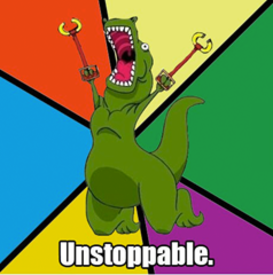Negative Calorie Foods

kagome5555
Posts: 35 Member
What's you guys' take on the controversy that is negative calorie foods. I've found a few lists online that list all the fruits and veggies that are supposed to be 'negative calories' but I still log them.
Do you guys log these foods as calories?
Do you guys log these foods as calories?
0
Replies
-
I used to not log celery, but now I do. It doesn't really make a difference though because it's so low cal xD0
-
I don't believe there is such a thing as negative calorie food. ALL food affects your body in one way or another. Even if it's incredibly low calorie, it still has sugar, fiber, protein, etc...that needs to be factored in.0
-
negative sounds ridiculous but i don't log my fruits. if i did, i'd probably stop eating them so i could eat something else to maintain my calories. and it's very good for you0
-
The only reason someone may claim it is a "negative calorie food", is because it takes more calories to eat/chew/process the food than it has in calories.
The body is incredibly efficient at processing the food with a few calories.
So any food that is very low in calories could be considered "negative".
Trying to calculate how negative each food is, would be VERY difficult to do.
Not worth your time, since the calories will probably only be a fraction of your daily totals.
I log every food, low or high in calories, since I also track other things such as sodium, carbs, etc.
So I recommend to you, log everything, including of course exercise that will be orders of magnitude larger in calories burned than what you could save with those "neg cal" foods0 -
I don't really believe in neg calorie foods and I do log veggies because they have nutrients in them and I like to see if there is anything I am lacking. if I didn't log veggies it would throw off some of my #s.0
-
They don't exist. http://www.answerfitness.com/269/negative-calorie-foods-fact-fiction/
An excerpt from the above link:
Is Celery Really a Negative Calorie Food?
While the list of negative calorie foods has ballooned to include everything from beets to strawberries and mangoes (yes, I’m being serious here), celery is the most commonly cited negative calorie food.
From a nutritional standpoint, celery is pretty much empty. It’s basically made up of water, sodium, some trace minerals and something called cellulose — which is a form of vegetable fiber than the human body cannot digest. It contains no protein or fat and marginal carbohydrates. Any other nutrition in celery is in the form of vitamins, minerals and enzymes, which contain no calories.
In fact, aside from iceberg lettuce and cucumbers, you probably couldn’t find a less nutritious, lower-calorie vegetable to eat. These foods are already about as close as you can get to eating zero calories. Close, but not quite, as we’ll see in a moment.
A large, stalk of celery weighing in at 2.2 ounces contains only nine calories. Negative calorie diet advocates claim that the mere process of chewing and digesting celery requires an expenditure of energy that exceeds the 9 calories present in the celery. Therefore, the argument goes, celery has “negative calories.”
Again, this all sounds good in theory, but what about in practice?
Issues with the Negative Calorie Foods Theory
There are some flaws with the negative calorie food theory, however.
First, the reason that certain foods like celery are already low in calories is exactly because of their high-non-caloric nutritional content. The fact that cellulose, water and minerals like sodium contain no calories is already figured into the food’s caloric-content. That’s why it has minimal calories in the first place. Negative food advocates want to double-dip here, and have you believe that the non-caloric nutrients like cellulose lower its effective calorie levels even more, but that’s just not how it works. This is already baked-in.
Second, the whole argument that the body burns more calories chewing and digesting negative calorie foods like celery is also suspect.
Yes, the body does expend a certain amount of energy to digest food, but that expenditure — even with foods that contain a high-percentage of non-caloric nutrients like cellulose — is actually fairly minimal.
Typically, the body will expend 10 - 15 percent of the calories you consume each day to fuel digestion. Let’s just throw the negative calorie food gurus a bone and say that for foods that are rich in non-digestible nutrients like cellulose, that number is actually as high as 50 percent of calories consumed (I have no evidence for this claim — I’m just being generous to prove a point.)
In the case of celery — the poster child of all negative calorie foods – you would be burning an extra 4.5 calories per each 9 calorie, 2.2 oz serving of celery. That would put your effective net calories at 4.5 (9/50% = 4.5 calories) — hardly “negative calorie” territory.
And because the amount of energy expended on digestion of foods is always expressed as a percentage, to have a negative calorie effect, digestion would have to constitute at least 101% of the energy consumed in order to create a negative calorie environment — something which is physically impossible.
So it appears that the food that is the best candidate for qualifying as a negative calorie food — celery – can’t even hit the break-even point, let alone become “calorie-negative.”0 -
There's no such thing as a negative calorie food.0
This discussion has been closed.
Categories
- All Categories
- 1.4M Health, Wellness and Goals
- 397K Introduce Yourself
- 44.2K Getting Started
- 260.9K Health and Weight Loss
- 176.3K Food and Nutrition
- 47.6K Recipes
- 232.8K Fitness and Exercise
- 455 Sleep, Mindfulness and Overall Wellness
- 6.5K Goal: Maintaining Weight
- 8.7K Goal: Gaining Weight and Body Building
- 153.3K Motivation and Support
- 8.3K Challenges
- 1.3K Debate Club
- 96.5K Chit-Chat
- 2.6K Fun and Games
- 4.5K MyFitnessPal Information
- 16 News and Announcements
- 18 MyFitnessPal Academy
- 1.4K Feature Suggestions and Ideas
- 3.1K MyFitnessPal Tech Support Questions






